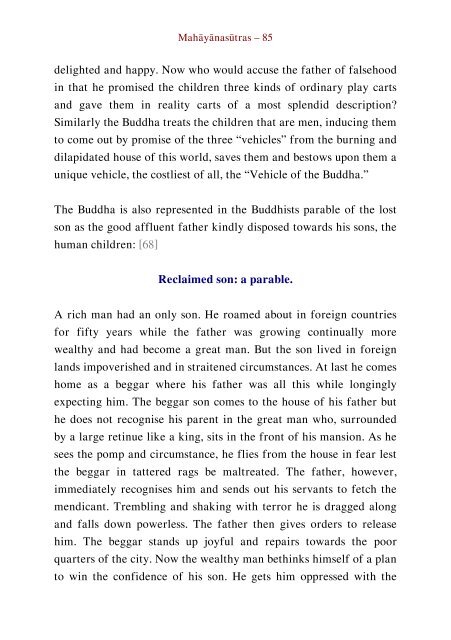Literary History of Sanskrit Buddhism
A study by J. K. Nariman of Sanskrit Buddhism from the Early Buddhist Tradition up to the Mahayana texts proper.
A study by J. K. Nariman of Sanskrit Buddhism from the Early Buddhist Tradition up to the Mahayana texts proper.
Create successful ePaper yourself
Turn your PDF publications into a flip-book with our unique Google optimized e-Paper software.
Mahāyānasūtras – 85<br />
delighted and happy. Now who would accuse the father <strong>of</strong> falsehood<br />
in that he promised the children three kinds <strong>of</strong> ordinary play carts<br />
and gave them in reality carts <strong>of</strong> a most splendid description?<br />
Similarly the Buddha treats the children that are men, inducing them<br />
to come out by promise <strong>of</strong> the three “vehicles” from the burning and<br />
dilapidated house <strong>of</strong> this world, saves them and bestows upon them a<br />
unique vehicle, the costliest <strong>of</strong> all, the “Vehicle <strong>of</strong> the Buddha.”<br />
The Buddha is also represented in the Buddhists parable <strong>of</strong> the lost<br />
son as the good affluent father kindly disposed towards his sons, the<br />
human children: [68]<br />
Reclaimed son: a parable.<br />
A rich man had an only son. He roamed about in foreign countries<br />
for fifty years while the father was growing continually more<br />
wealthy and had become a great man. But the son lived in foreign<br />
lands impoverished and in straitened circumstances. At last he comes<br />
home as a beggar where his father was all this while longingly<br />
expecting him. The beggar son comes to the house <strong>of</strong> his father but<br />
he does not recognise his parent in the great man who, surrounded<br />
by a large retinue like a king, sits in the front <strong>of</strong> his mansion. As he<br />
sees the pomp and circumstance, he flies from the house in fear lest<br />
the beggar in tattered rags be maltreated. The father, however,<br />
immediately recognises him and sends out his servants to fetch the<br />
mendicant. Trembling and shaking with terror he is dragged along<br />
and falls down powerless. The father then gives orders to release<br />
him. The beggar stands up joyful and repairs towards the poor<br />
quarters <strong>of</strong> the city. Now the wealthy man bethinks himself <strong>of</strong> a plan<br />
to win the confidence <strong>of</strong> his son. He gets him oppressed with the


















